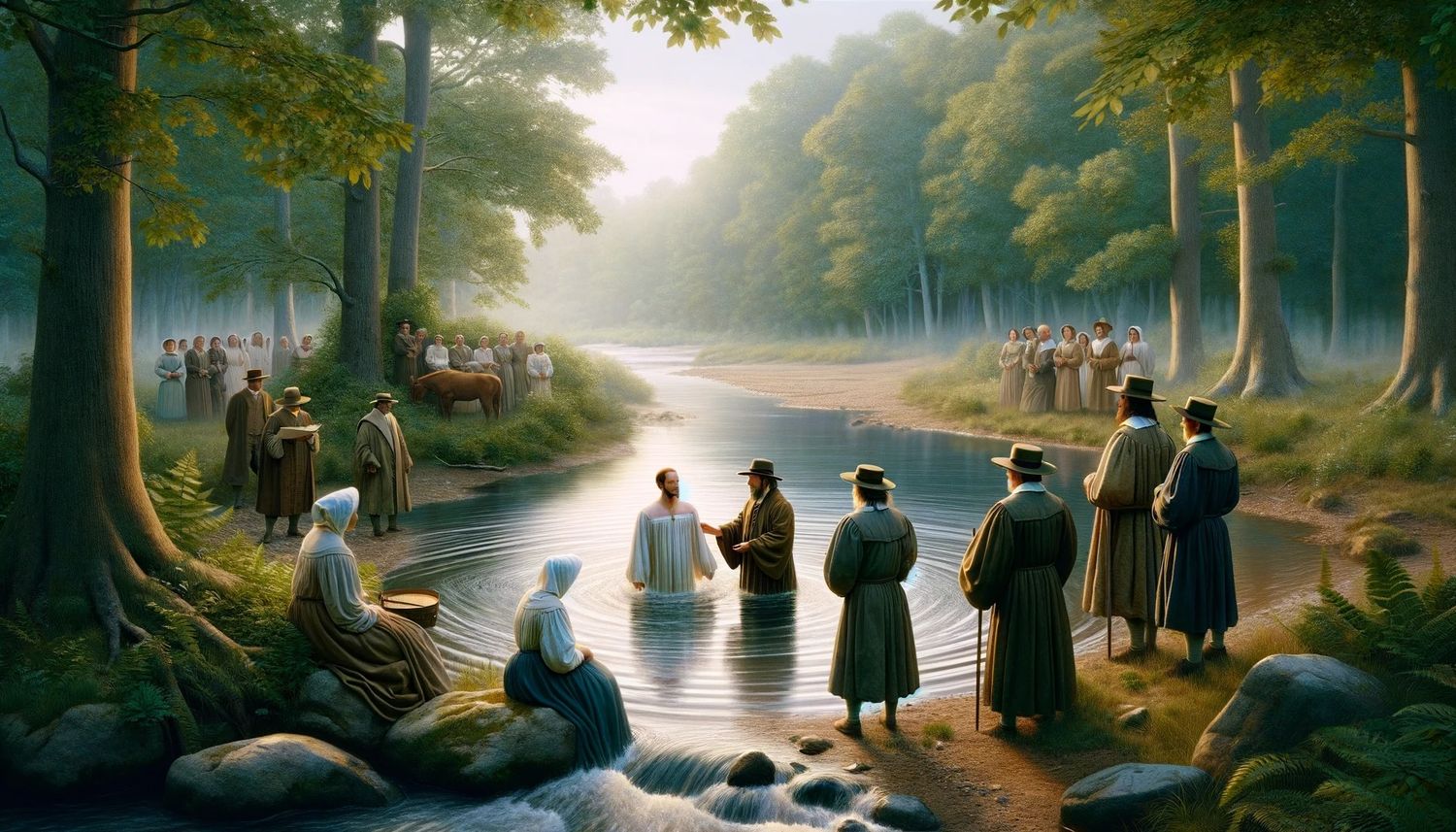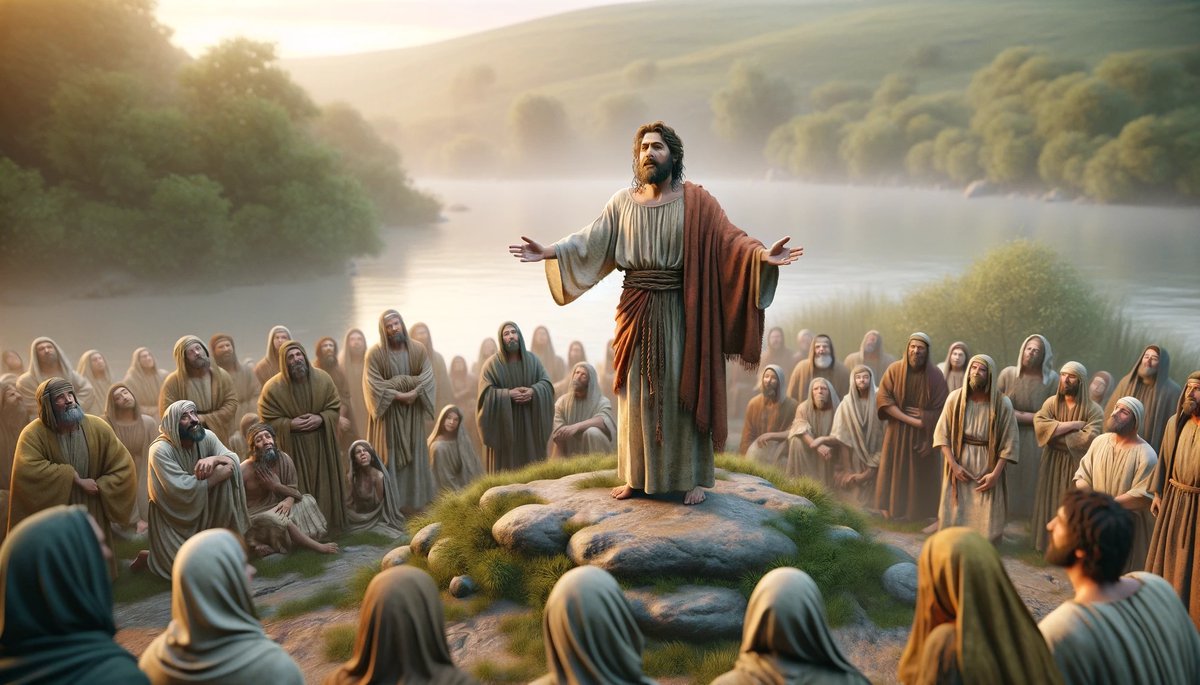Home>Theology and Spirituality>When Did The Baptist Religion Start


Theology and Spirituality
When Did The Baptist Religion Start
Published: February 21, 2024
Peter Smith, Editorial Director at Christian.net, combines deep insights into faith, politics, and culture to lead content creation that resonates widely. Awarded for his contributions to religious discourse, he previously headed a major organization for religious communicators, enhancing dialogue on faith's societal impacts.
Discover the origins and history of the Baptist religion, its beliefs, and its impact on theology and spirituality. Learn about the beginnings of this influential faith tradition.
(Many of the links in this article redirect to a specific reviewed product. Your purchase of these products through affiliate links helps to generate commission for Christian.net, at no extra cost. Learn more)
Table of Contents
Introduction
The Baptist religion is a significant and influential Christian denomination with a rich history and deep theological roots. Its development and evolution have played a pivotal role in shaping the religious landscape, not only in the United States but also across the globe. Understanding the origins, key figures, beliefs, and practices of the Baptist faith provides valuable insights into its enduring impact on spirituality and society.
The story of the Baptist religion is a compelling narrative that spans centuries, marked by resilience, reform, and unwavering faith. Exploring its origins and the individuals who shaped its trajectory unveils a tapestry of diverse experiences, theological convictions, and cultural influences. As the Baptist faith continues to thrive and adapt in the modern era, its historical journey serves as a testament to the enduring power of religious conviction and the human spirit.
Delving into the Baptist religion offers a glimpse into the complexities of faith, the dynamics of religious communities, and the enduring quest for spiritual truth. By examining its foundational principles, core beliefs, and contemporary expressions, we gain a deeper appreciation for the Baptist tradition's enduring relevance and its profound impact on the lives of millions of adherents worldwide.
The following exploration of the Baptist religion will illuminate its historical significance, doctrinal distinctiveness, and the enduring legacy of its proponents. From its humble beginnings to its present-day manifestations, the Baptist faith continues to inspire, challenge, and resonate with individuals seeking a profound connection to their spirituality and a community of believers who share their convictions.
Read more: When Did Catholicism Start In Spain
Origins of the Baptist Religion
The origins of the Baptist religion can be traced back to the early 17th century in England. The tumultuous religious landscape of that era, characterized by the Protestant Reformation and the subsequent splintering of the Christian church, set the stage for the emergence of diverse theological movements. It was within this milieu that the seeds of the Baptist tradition were sown.
One of the defining moments in the birth of the Baptist faith was the English Reformation, which challenged the authority of the Roman Catholic Church and paved the way for the proliferation of alternative religious expressions. As dissenting voices within Protestantism sought to reform and purify the church, various theological perspectives began to take shape, each advocating for distinct interpretations of scripture and ecclesiastical practices.
Amidst this ferment of religious fervor, several key developments contributed to the formation of Baptist beliefs and principles. The influence of individuals such as Thomas Helwys and John Smyth, who championed the autonomy of local congregations and the believer's baptism, played a pivotal role in shaping the early Baptist identity. Their emphasis on voluntary faith, adult baptism by immersion, and the separation of church and state laid the groundwork for the distinctive tenets that would come to define the Baptist tradition.
Furthermore, the persecuted status of dissenting believers in England led to the migration of some early Baptists to the American colonies, where they found greater religious freedom. This diaspora facilitated the spread of Baptist ideals across the Atlantic, contributing to the growth and diversification of the movement in the New World.
The Baptist religion's origins are deeply intertwined with the quest for religious liberty, the pursuit of scriptural fidelity, and a fervent commitment to individual conscience. These formative influences, rooted in the historical context of religious upheaval and theological exploration, continue to resonate within the contemporary Baptist ethos, shaping its doctrinal distinctiveness and enduring legacy.
The early years of the Baptist tradition were marked by a spirit of dissent, resilience, and unwavering conviction, laying the groundwork for a faith tradition that would evolve and proliferate across continents, leaving an indelible imprint on the tapestry of Christian history.
Key Figures in Baptist History
The history of the Baptist religion is intricately woven with the contributions of remarkable individuals whose vision, leadership, and theological insights have left an indelible mark on the movement. These key figures played pivotal roles in shaping the doctrinal distinctiveness, organizational structures, and missionary zeal that characterize the Baptist tradition.
Thomas Helwys
Thomas Helwys, an influential figure in early Baptist history, is renowned for his unwavering commitment to religious freedom and the autonomy of the church. In 1612, he authored "A Short Declaration of the Mistery of Iniquity," a groundbreaking treatise advocating for liberty of conscience and the separation of church and state. Helwys' steadfast belief in the principle of soul liberty, which asserts the right of every individual to worship according to their own conscience, laid a foundational cornerstone for Baptist theology and its enduring emphasis on religious freedom.
John Smyth
John Smyth, a prominent figure in the early 17th century, is credited with establishing the first Baptist congregation in Amsterdam. Smyth's theological journey led him to reject infant baptism and embrace the practice of believer's baptism by immersion, a defining characteristic of the Baptist faith. His pioneering efforts in promoting congregational autonomy and the priesthood of all believers contributed significantly to the theological framework of the Baptist tradition.
Roger Williams
Roger Williams, a champion of religious liberty and the founder of the colony of Rhode Island, advocated for the complete separation of church and state. His advocacy for freedom of conscience and the rights of indigenous peoples resonated deeply with Baptist principles, influencing the development of religious tolerance and individual liberty in the American colonies. Williams' enduring legacy as a proponent of religious pluralism and civil rights continues to inspire generations of Baptist adherents.
Lottie Moon
Lottie Moon, a trailblazing Baptist missionary to China in the 19th century, exemplifies the spirit of global evangelism and compassionate outreach that defines the Baptist tradition. Her unwavering dedication to sharing the gospel and her advocacy for the needs of the Chinese people have made an enduring impact on Baptist missions and the empowerment of women in ministry.
These key figures, among many others, have shaped the trajectory of the Baptist tradition, leaving a profound legacy of theological insight, social advocacy, and missionary zeal. Their contributions continue to inspire and inform the vibrant tapestry of Baptist identity, reflecting a commitment to faith, freedom, and the transformative power of the gospel.
Spread of the Baptist Religion
The spread of the Baptist religion is a testament to the enduring impact of its theological convictions, missionary zeal, and adaptability to diverse cultural contexts. From its humble beginnings in England, the Baptist faith journeyed across continents, taking root in various regions and contributing to the rich tapestry of global Christianity.
The diaspora of early Baptist believers to the American colonies in the 17th century marked a significant turning point in the movement's expansion. Fleeing religious persecution in England, these dissenting voices sought refuge in the New World, where they found greater religious freedom. This migration not only provided a haven for Baptist communities but also facilitated the dissemination of Baptist ideals in the burgeoning American society.
The Baptist faith's emphasis on individual conscience, congregational autonomy, and believer's baptism resonated with diverse groups, leading to the establishment of numerous Baptist congregations throughout the American colonies. The proliferation of Baptist churches, each with its unique expressions of faith and worship, contributed to the movement's rapid growth and influence in shaping the religious landscape of early America.
Furthermore, the 19th and 20th centuries witnessed the global expansion of the Baptist faith through missionary endeavors. Baptist missionaries, inspired by a fervent commitment to sharing the gospel and serving marginalized communities, ventured to distant lands, including Africa, Asia, and Latin America. Their dedication to evangelism, education, and humanitarian aid not only spread the Baptist message but also fostered enduring relationships with diverse cultures, leading to the establishment of indigenous Baptist communities around the world.
The adaptability of the Baptist faith to different cultural contexts, coupled with its emphasis on local autonomy and indigenous leadership, contributed to the organic growth and diversification of Baptist denominations globally. This decentralized structure allowed for contextualized expressions of worship, theology, and ministry, fostering a vibrant tapestry of Baptist identity that resonates with the unique cultural and social dynamics of each region.
Today, the Baptist faith continues to thrive as a global phenomenon, with a presence in numerous countries and a diverse array of denominational affiliations. The enduring legacy of Baptist missionaries, theologians, and grassroots leaders has contributed to the movement's resilience and relevance in an ever-changing world, reflecting a commitment to the transformative power of faith and the enduring mission of sharing the gospel with all nations.
Baptist Beliefs and Practices
The Baptist tradition is characterized by distinctive beliefs and practices that have shaped its theological identity and communal life. Central to Baptist theology is the authority of scripture, emphasizing the primacy of the Bible as the ultimate source of divine revelation and guidance for faith and practice. This foundational commitment to scriptural authority underpins the doctrinal distinctiveness of the Baptist faith and informs its ethical, ecclesiological, and missional perspectives.
Believer's Baptism: A defining feature of Baptist theology is the practice of believer's baptism by immersion. This sacramental rite symbolizes the believer's identification with the death, burial, and resurrection of Jesus Christ and signifies their public confession of faith. The emphasis on voluntary, conscious decision-making in embracing baptism underscores the Baptist commitment to individual autonomy and personal faith expression.
Congregational Autonomy: Baptists uphold the principle of congregational autonomy, affirming the independence of local churches in matters of governance, doctrine, and ministry. Each congregation is self-governing, with the freedom to discern and enact its own policies, select leaders, and engage in mission and outreach initiatives. This decentralized structure reflects the Baptist commitment to the priesthood of all believers and the democratic governance of the church.
Soul Liberty: The Baptist tradition champions the principle of soul liberty, asserting the freedom of every individual to interpret scripture, worship, and live according to their conscience without coercion or imposition. This foundational belief in the autonomy of the individual conscience aligns with the Baptist commitment to religious freedom and the separation of church and state.
Missional Zeal: Baptists are known for their fervent commitment to evangelism, missions, and social engagement. The Great Commission, as articulated in the New Testament, serves as a guiding imperative for Baptist communities, inspiring a proactive stance in sharing the gospel and addressing social injustices. This missionary zeal has led to the establishment of educational institutions, healthcare facilities, and humanitarian organizations, reflecting the holistic nature of Baptist mission endeavors.
Worship and Sacraments: Baptist worship practices vary widely, encompassing a spectrum of liturgical styles, music traditions, and sacramental observances. While Baptists emphasize the priesthood of all believers and the spiritual priesthood of Christ, the celebration of the Lord's Supper holds a central place in many Baptist congregations, symbolizing the communal remembrance of Christ's sacrificial death and the anticipation of his return.
The Baptist beliefs and practices, rooted in a deep reverence for scripture, a commitment to individual autonomy, and a fervent dedication to mission and worship, continue to shape the vibrant tapestry of Baptist identity and its enduring impact on the global Christian community.
Read more: When Did John The Baptist Start His Ministry
Modern Baptist Denominations
Modern Baptist denominations encompass a diverse array of theological perspectives, worship styles, and organizational structures, reflecting the dynamic evolution and contextual adaptation of the Baptist tradition in contemporary society. While sharing core theological tenets, modern Baptist denominations exhibit a rich tapestry of doctrinal emphases, ecclesiastical practices, and cultural expressions that contribute to the vitality and resilience of the movement.
One prominent modern Baptist denomination is the Southern Baptist Convention (SBC), which represents one of the largest and most influential Baptist bodies in the United States. Known for its conservative theological stance, the SBC emphasizes evangelism, missions, and social conservatism. The denomination's commitment to biblical inerrancy, complementarian theology, and traditional family values has shaped its identity and public engagement, influencing the broader evangelical landscape.
In contrast, the American Baptist Churches USA (ABCUSA) embodies a more moderate and ecumenical approach to Baptist identity. With a commitment to social justice, interfaith dialogue, and theological diversity, the ABCUSA embraces a broad spectrum of theological perspectives and congregational autonomy. Its inclusive stance on issues such as gender equality, LGBTQ+ inclusion, and racial reconciliation reflects a progressive trajectory within the Baptist tradition.
The Cooperative Baptist Fellowship (CBF) represents a distinctive movement within modern Baptist denominations, emphasizing collaborative ministry, missions, and theological education. Grounded in a commitment to Baptist principles and the priesthood of all believers, the CBF fosters a spirit of cooperation among congregations and individuals, promoting innovative approaches to mission, church planting, and community engagement.
Furthermore, the National Baptist Convention of America, Inc. (NBCA) and the National Baptist Convention, USA, Inc. (NBCUSA) are prominent African American Baptist denominations that have historically championed civil rights, community empowerment, and theological education. These denominations embody a rich heritage of spiritual resilience, social advocacy, and vibrant worship traditions, reflecting the unique cultural and historical experiences of African American Baptist communities.
The diversity of modern Baptist denominations extends beyond the United States, encompassing global expressions of the faith. Baptist World Alliance (BWA) serves as a unifying platform for Baptists worldwide, fostering collaboration, theological dialogue, and humanitarian initiatives across diverse cultural contexts. Its global impact underscores the expansive reach and enduring relevance of the Baptist tradition on a global scale.
The mosaic of modern Baptist denominations reflects a commitment to theological fidelity, contextual relevance, and collaborative engagement, embodying the enduring legacy of Baptist principles while embracing the complexities of contemporary society. This diversity of expression within the Baptist family underscores the movement's resilience, adaptability, and enduring commitment to the transformative power of the gospel in an ever-changing world.
Conclusion
The Baptist religion stands as a testament to the enduring power of faith, the resilience of religious conviction, and the transformative impact of theological principles on individuals and communities. From its humble origins in 17th-century England to its global presence in the modern era, the Baptist tradition has woven a rich tapestry of theological distinctiveness, missionary zeal, and cultural diversity.
The journey of the Baptist faith, marked by the steadfast commitment to individual conscience, congregational autonomy, and the proclamation of the gospel, reflects a profound narrative of spiritual resilience and societal influence. The foundational principles of believer's baptism, soul liberty, and congregational autonomy have not only shaped the doctrinal distinctiveness of the Baptist tradition but have also inspired generations of believers to embrace a faith characterized by personal conviction and communal engagement.
The spread of the Baptist religion across continents, fueled by the missionary fervor of its adherents, has contributed to the establishment of diverse expressions of the faith, each resonating with the unique cultural, social, and theological dynamics of its context. This global diversity underscores the adaptability and relevance of Baptist beliefs and practices in addressing the spiritual and social needs of diverse communities, reflecting a commitment to the transformative power of the gospel in a pluralistic world.
Moreover, the modern landscape of Baptist denominations, encompassing a spectrum of theological emphases, worship styles, and social engagements, reflects the dynamic evolution and contextual adaptation of the Baptist tradition. The diverse expressions within the Baptist family embody a commitment to theological fidelity, contextual relevance, and collaborative engagement, underscoring the movement's resilience, adaptability, and enduring commitment to the transformative power of the gospel in an ever-changing world.
In conclusion, the Baptist religion's historical journey, theological distinctiveness, and global impact serve as a compelling narrative of faith, freedom, and the enduring quest for spiritual truth. Its enduring legacy continues to inspire, challenge, and resonate with individuals seeking a profound connection to their spirituality and a community of believers who share their convictions. The Baptist tradition stands as a vibrant testament to the enduring relevance of faith, the transformative power of conviction, and the enduring mission of sharing the gospel with all nations.













